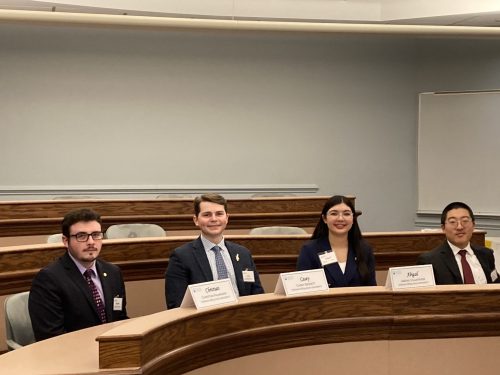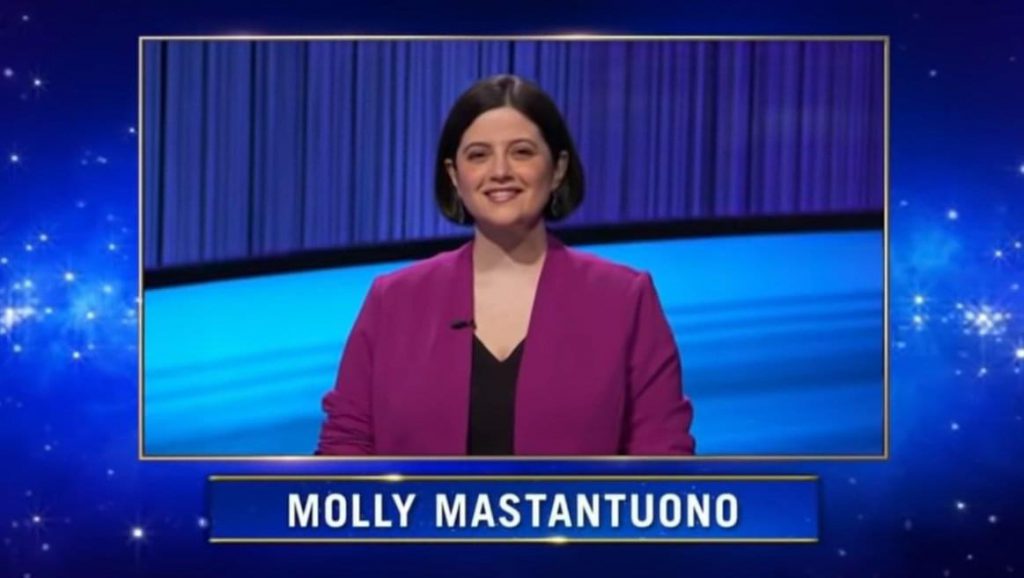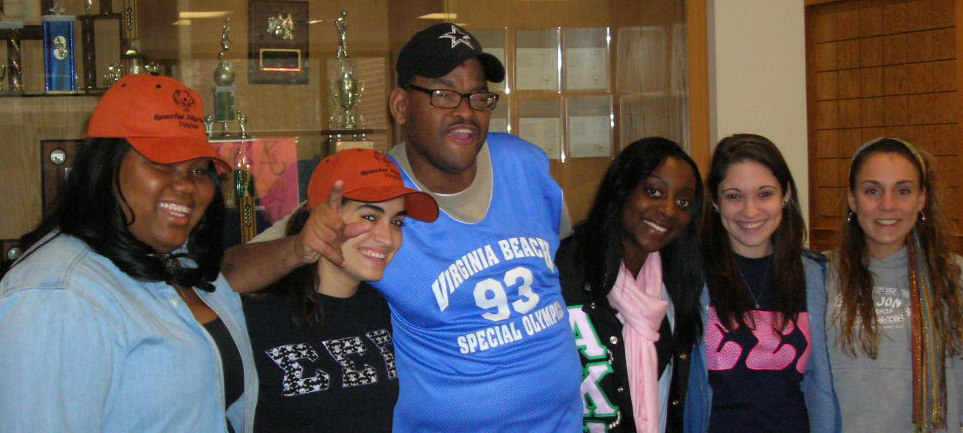The VWU Ethics Bowl team practices during the demonstration hosted annually in Clarke Hall.
Duda Bernardo|Marlin Chronicle
Virginia Wesleyan’s Ethics Bowl team debated the implications of artificial intelligence at the 25th annual Ethics Bowl on Feb. 7 at the University of Richmond, after holding a live demonstration for the VWU community.
Sponsored by the Virginia Foundation for Independent Colleges (VFIC), the annual collegiate Applied Ethics Bowl connects student teams from 17 VFIC member institutions every year. Students come together to debate real-world ethical dilemmas that increasingly impact people’s lives.
Dr. Kathy Merlock Jackson, professor of Media and Communication and faculty coordinator for the team, said VWU’s team “did an amazing job” at the competition.
They arrived home undefeated after winning rounds against multiple schools, including Hollins University, last year’s Ethics Bowl champions. However, the team did not have enough points to qualify for the championship round. “Virginia Wesleyan, though, was the only school to win all of its rounds,” Jackson said.
VWU has won twice since the competition’s inception, and it was twice the runner-up. Over the past four years, VWU’s team won thirteen of its rounds and lost three.
This year, the competition’s format changed. Instead of receiving only a topic, students were given four case studies in mid-November to prepare for the February debate.
The advance notice allowed them to conduct prior research and be better prepared for the competition.
The Robert Nusbaum Center hosted a debate demonstration for the team to practice in front of judges and an audience before the statewide event. The team gathered the VWU community at the Lighthouse on Tuesday, Feb. 4 for the demonstration.
For the debate demonstration, participants were split into two teams. Team one, which traveled to Richmond on Friday, included seniors Abigail Villacrusis, Casey Bennett and Christian Palmisano, along with junior Andrew Steiner. Team two consisted of juniors Anna Greenleaf and Lily Reslink and sophomore Avery Belisle. The team was accompanied by adviser Jackson.
Judges for the Ethics Bowl demonstration included Dr. Steven Emmanuel, professor of Philosophy, Dr. Kellie Holzer, professor of English, and Attorney at Law Henry “Hank” Howell, III.
The teams engaged in discussions on this year’s topic, “Ethics and Artificial Intelligence,” and proposed solutions for one of the four case studies they were given in advance.
Students elaborated on ethical principles and engaged in questioning and answering with the opposing team.
This year’s focus on AI challenged students to explore various ethical issues arising from the use and application of AI. The topic allowed students to consider the ethics behind this evolving technology.
Jackson said people should consider the ethics of any new technology. “We just think about how our lives are going to be made better, easier, and not really what the ethical dimensions of that will be,” she said.
She said AI has the potential to be life and society changing. “I think it would be a mistake not to consider the ethical implications for that, along with the technical side of it and the practical side of it too,” Jackson said.
Villacrusis said AI is like a calculator, a helpful but not reliable tool. “Before you use a calculator, you have to learn the formulas,” she said.
“No matter what you do, no matter what career you have, there’s gonna be some sort of AI to use, whether it’s Google Translate or ChatGPT or even just advanced Grammarly,” Villacrusis said.
AI has been making its way into higher education, prompting discussions about its potential benefits, challenges and now ethical implications.
Bennett said that AI has become popular very quickly and is something we are incorporating in our lives, despite the unexplored ethical ramifications of its use. “We’re using it, incorporating it, but there are still a lot of ethical questions unanswered,” Bennett said.
Villacrusis said the demonstration provided practice for performing in front of an audience. “While our team is experienced, there’s plenty of people and in past years that haven’t had to speak in front of an audience before, and that can be absolutely nerve-wracking,” she said.
At the competition, students must be prepared to ask and answer questions within short time frames, typically one to two minutes.
Jackson, who began coaching the team in 2012, said the demonstration is like having a dress rehearsal for a play. It gives students “the opportunity to perform before an audience, to see what their strengths are, what their weaknesses are, to look the part,” she said.
Jackson believes this is the most valuable way for students to prepare days before they leave. Students “have the opportunity to argue a case before an audience, and they get really good feedback, and they’re able to kind of modify their performances after that, given the comments people in the audience make and the judges make,” she said.
Bennett and Villacrusis said they were unsure what to expect with the new format. Villacrusis mentioned the importance of getting feedback from the judges as a way to prepare.
“It is hard to prep because a lot of Ethics Bowl involves bouncing off the other team,” he said. While they can prepare their opening and questions, they may still need to adjust their approach during the debate.
Students, faculty and members of the community gathered to support the team during the demonstration.
“I think it makes me and my view of the world a little more round than you know, the one discipline I might be focused on,” Silvia said.
Katie Baker, a senior, said she has attended as many practices as possible over the years to support her friend, Palmisano. “It’s more about being supportive because you know that they are probably stressed and I just want to be there for him,” she said.
“I’ve helped with the deliberative dialogues that are put on by the Nusbaum Center before, and those really give people a chance to think critically and respond to each other,” Baker said. She added that events like this offer a space for people to share their opinions.
Since its inception in 2000, the Ethics Bowl has presented more than 156 different cases based on ethical dilemmas in contemporary life.
With almost half of the participants graduating this year, the team hopes the demonstration will inspire more students to join the Ethics Bowl.
Bennett has been a part of the Ethics Bowl team since he was a freshman. He said he was excited to pass the torch going into his fourth year in the competition.
By Duda Bernardo


